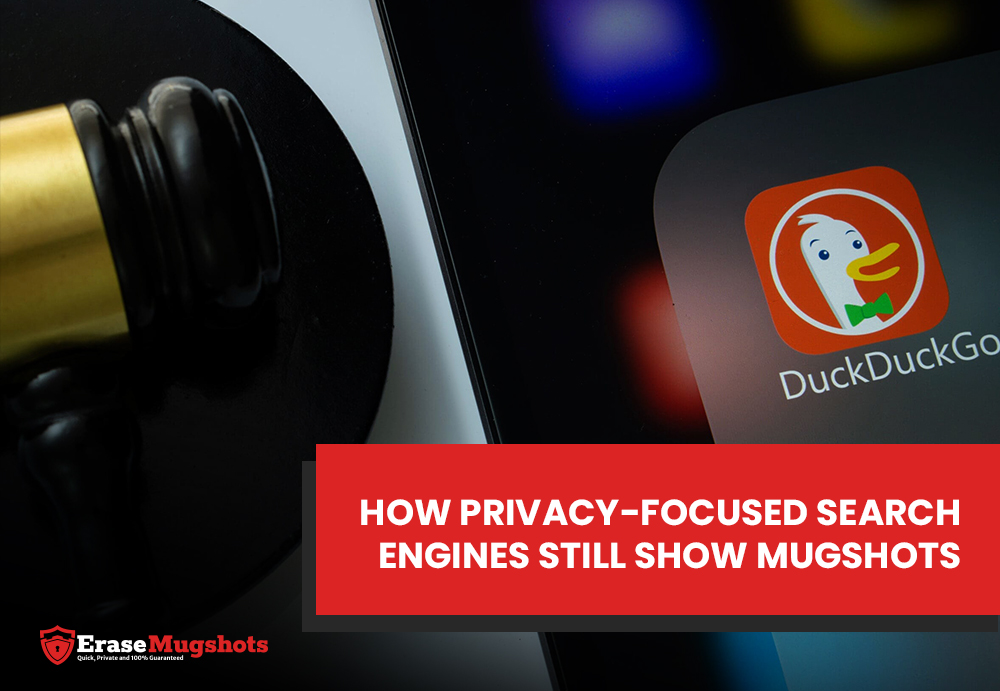100% Satisfaction Guaranteed
We offer a total mugshot removal solution to remove your mugshot and arrest details from the internet once and for all.

Table of Contents
Imagine searching your name and seeing a mugshot appear in the results—even on a platform that claims to protect your privacy. It happens more often than you might think. Despite promoting anonymous searches and minimal data collection, privacy-focused search engines can still display mugshots because they index publicly available content from across the web.
Privacy-focused search engines are designed to protect your personal data and online privacy. Unlike traditional search engines, they don’t track your search history, IP address, or clicks, and they don’t use your search queries to build user profiles or serve targeted ads. These engines aim to provide unbiased search results while maintaining user privacy by avoiding the collection of personal data and user tracking.
Popular examples of privacy-focused search engines include:
These platforms limit data collection and offer a private search experience that protects user data. However, user privacy doesn’t mean censorship or filtering of content on the web.
Even though these search engines protect user privacy by not storing browsing history or search data, they still pull information from public sources—including mugshot websites and public arrest records. Since mugshots are already publicly available online, the search engine’s crawlers index this content just like any other public information.
These engines:
Most privacy-focused search engines don’t filter or remove results unless legally required. So if your mugshot exists on a public site, it can still appear in search results—even when using a privacy-oriented search engine.
Mugshots generally originate from public records and official sources, including:
It’s important to understand that search engines don’t create or host this content. They index what’s already available on the internet. Therefore, even with privacy-focused search engines, mugshots remain accessible unless removed at the source.
The key difference lies in how they treat your data:
However, they still use crawlers to find and deliver search results from the internet. Their goal is to provide access to information while protecting user privacy by avoiding the collection and storage of personal data. This is why mugshots can still appear—these search engines don’t suppress public content unless they are legally obligated to do so.
Seeing a mugshot associated with your name in any search engine can have significant negative consequences:
Even if your case was dismissed, expunged, or you were found innocent, the mugshot may still appear because most search engines don’t verify legal outcomes—they index available content regardless of context.
Removing mugshots from privacy-focused search engines is possible but challenging. This process primarily depends on the website hosting the image, rather than the search engine itself.
Here are the steps you can take:
If the source site removes the image, the search engine will usually drop it after re-indexing. However, this process can take time and may require persistence.
If removal isn’t successful, you can still take steps to manage your online presence and mitigate the impact:
While they do not control the content indexed, privacy-focused search engines excel at protecting your personal information by:
For example, DuckDuckGo and Brave Search are privacy-oriented search engines that do not track users or store personal data, ensuring that your searches remain private. Qwant, a European search engine, complies with strict data protection regulations, such as GDPR, to further protect user data.
Privacy-focused search engines are valuable tools for maintaining user privacy and preventing the collection of personal data and user tracking. However, they do not control or censor the public content they index. Mugshots and other sensitive information can still appear in search results if they exist on public websites.
Understanding how these search engines work empowers you to take appropriate steps—whether that means requesting content removal, managing your online reputation, or utilizing legal options—to protect your online privacy and reputation.
By combining privacy-focused search engines with good online practices, such as using a private browser and being mindful of your digital footprint, you can better safeguard your personal information while still accessing the information you need.
We offer a total mugshot removal solution to remove your mugshot and arrest details from the internet once and for all.